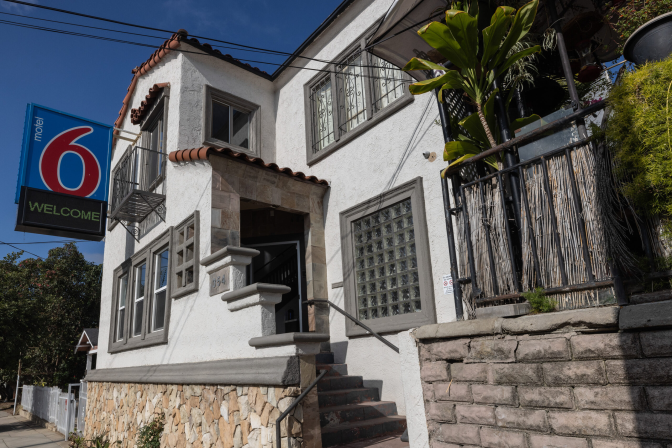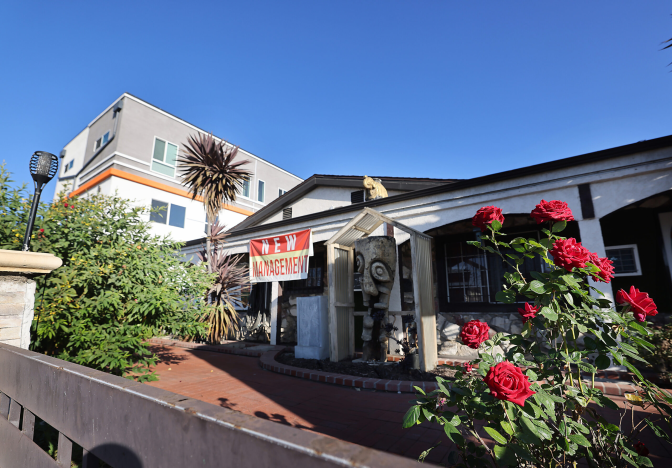This story is free to read because readers choose to support LAist. If you find value in independent local reporting, make a donation to power our newsroom today.
Los Angeles Orders More Residential Hotels To Stop Renting To Tourists

This story was produced in partnership with ProPublica’s Local Reporting Network. Read part one and part two of the investigation into L.A.’s residential hotels.
The Los Angeles Housing Department has ordered the owners of four buildings meant to house some of the city’s poorest residents to stop renting rooms to tourists, following a review that was prompted by reporting by Capital & Main and ProPublica.
The news organizations documented how some owners of the buildings, known as residential hotels, were advertising short-term rentals online despite a 2008 law aimed at preserving the rooms as residential. Landlords who convert the buildings to other uses or demolish them must replace the units or pay into a city housing fund.
The new enforcement actions bring the number of residential hotels cited by the Housing Department for violating the residential hotel law to 21. The agency had sent violation notices to 17 residential hotels within weeks of the Capital & Main and ProPublica investigation.
In all, about 750 residential hotel rooms could be turned back into low-cost permanent housing for L.A. residents who have few other options — if the city’s citations are upheld in court and if the city aggressively enforces the law.
The most recent Housing Department orders to stop renting to tourists were issued earlier this month to the Hollywood Hills Hotel, which offers rooms with city views for up to $200 per night; the Motel 6 San Pedro; the Central Inn Motel near the University of Southern California; and the Royal Hawaiian Motel in Mid City. The Hollywood Hills Hotel is permitted to offer some rooms to tourists, but inspectors found more rooms were rented short-term than is allowed.
Dinesh Vora, one of the Central Inn’s owners, said he plans to appeal the Housing Department orders. “To have someone say you can only rent long-term, that wouldn’t be sufficient for us,” Vora said. Ricky Patel, the registered agent of the Royal Hawaiian, declined to comment on the enforcement or whether the hotel intended to appeal. “It’s a touchy subject,” Patel said. One of the owners of the Hollywood Hills Hotel, Cole Harris, declined to comment on Dec. 12 because, he said, he wasn’t involved in day-to-day operations. And managers didn’t return phone messages left at the hotel. The owner of the Motel 6 didn’t respond to calls or emails.

Sixteen of 17 hotel owners who were cited for failure to comply with the residential hotel law in July appealed their notices to the Housing Department’s general manager and attended hearings conducted by phone between September and November.
A department hearing officer recently denied appeals from eight of those hotels, including the American Hotel in the Arts District and the H Hotel and Hometel Suites in Koreatown, which were highlighted in our initial story for transforming their buildings into boutique hotels. The agency postponed five other appeals involving hotels that have signed contracts to provide temporary homeless housing through the city’s Inside Safe program or that said they were considering participating in the program.
Capital & Main and ProPublica found that the mayor’s marquee homeless initiative has given funding to eight residential hotels, even though they are already meant to provide housing to low-income people. Some residential hotels were awarded contracts despite appearing to violate the residential hotel ordinance.
In evaluating the evidence in the American Hotel case, Housing Department hearing officer Andre Brown noted the city’s declared housing and homelessness emergency and wrote that the residential hotel ordinance had been passed to address “a severe shortage of decent safe and sanitary rental housing in the City resulting from the loss of single room occupancy and residential hotel units.”
None of the hotel owners disputed the city’s allegation that they offered short-term rentals, but they argued that they’d done so legally because they paid hotel taxes to the city. The hearing officers, however, said the hotel owners violated a clear ban on offering their rooms for rent on a nightly or weekly basis, known in city law as transient use.
“It is undisputed that the Residential Hotel Ordinance (RHO) prohibits transient use of units that have been determined to be Residential Units,” Brown wrote in the American case.
Frank Weiser, an attorney who represents all eight hotels, including the American, said the hotels plan to appeal the city’s decisions in federal court. On the one hand, the city has been treating them as residential hotels barred from renting to tourists, he said, but on the other, it has openly accepted tax payments from the hotels for doing just that.
“The city was collecting an enormous amount of tax,” Weiser said. “It’s totally contradictory.”
City housing inspector Jean-Claude Olivier said at the American appeal hearing that payment of hotel taxes doesn’t change the approved building use, and Brown noted in his decision that the ordinance doesn’t address such situations.
Just one hotel, the 25-room Knights Inn near Dodger Stadium, won its case. A hearing officer found the hotel wasn’t given sufficient opportunity to appeal its residential hotel designation and that there wasn’t enough evidence to show the hotel had ever been residential.
Mayor Karen Bass, who recently heralded bringing 21,000 homeless Angelenos into temporary housing in the last year, has signaled that she thinks the residential hotel law might need an overhaul.
In an executive directive in November, she said some of the hotels might not meet current building code standards and ordered the Housing Department to report on the city’s residential hotel supply, the hotels’ occupancy rates and recent enforcement so that city officials could recommend ways to update the law.
The report hadn’t been made public as of Wednesday afternoon California time.
Copyright 2023 Capital & Main







